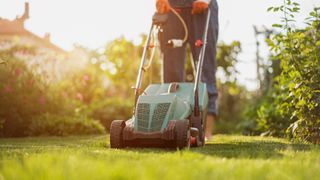How often to mow your lawn depends on various factors, including rainfall, sunshine hours and the seasons. This means that the location of your yard will make a huge difference to mowing frequency. It’s also a good idea to understand a little about the nature of turf and how grass grows. This will help you exploit its traits to your own – and your garden’s – advantage. We’ve asked an expert to give us his advice on how often to mow your lawn to help you cut out the guesswork. These pro tips, plus our pick of the best gas lawn mowers (opens in new tab) or the best electric lawn mowers (opens in new tab), should soon have your lawn looking vibrant, healthy and emerald green.
How often to mow your lawn
A well-maintained lawn is a wonderful place to kick back and relax after a hard day. To help you achieve this, we asked lawn expert David Hedges-Gower to tell us how often to mow for your perfect patch of lush, green heaven. Mow with the seasons When the temperature falls below about 40°F grass becomes dormant, so it won’t grow. This means that mowing will do no good to your lawn. Once you see fresh new growth in spring, then that’s the time to get out your mower for the first cut of the season. Of course, the exact time will differ, depending on where you live. And when to stop mowing? It’s not an exact science either, but David sums it up nicely: “If it doesn’t stop growing, then don’t stop mowing.” Don’t forget the science The vast majority of lawn grass grows via a process called tillering. This means that it spreads horizontally, both in the soil and just above it, then sends up new shoots, naturally filling gaps and creating a lush sward made up of hundreds of little plants. Cut it down and you’re encouraging it to spread out again. But how long should your lawn be before you head out with the mower? Again, there’s no hard-and-fast rule. “Forget about the one-third thing,” says David. This oft-quoted system suggests you should mow a lawn once the growth is a third above the length you want to keep. David says, “At the end of the day, if you want a nice lawn, the more often you mow – or prune – it, the thicker it will get. Just use your eyes.” Don’t panic during hot months Sunshine and rain are the ideal conditions for vigorous growth, but when the temperature rises and water becomes less scarce, your lawn will grow more slowly – or not at all. However, there’s absolutely no reason to panic, says David. “Lawns are tough. There’s no need to get the sprinkler out. Grass just shuts down during the summertime. Some old plants do die, just like us, but most just go to sleep and wake up when they’re ready. Losing a bit of color for eight weeks isn’t the end of the world. Water is the most valuable resource we have, so let’s not waste it when grass is perfectly adapted to these conditions.” Discover more guides for the garden… Best riding lawn mower (opens in new tab) Best robot lawn mower (opens in new tab) Best chainsaws (opens in new tab) Best pool heaters (opens in new tab) Best swim spas (opens in new tab) Best water heaters (opens in new tab) Best patio heaters (opens in new tab)






